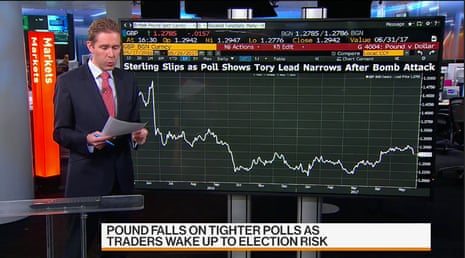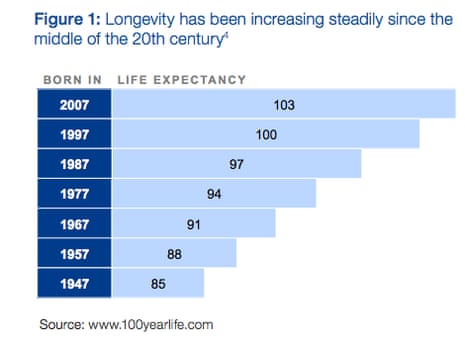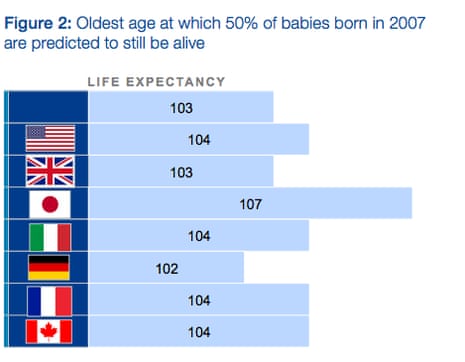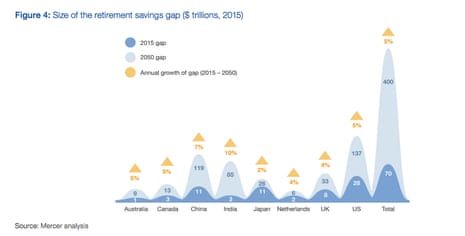A late PS: Here’s Phillip Inman on today’s market action:
FTSE 100 hits record high as election jitters drive pound down – as it happened
Sterling hits one-month low after YouGov reports that the Conservatives only have a five-point lead over Labour
- Latest: Footsie hits new time closing high
- FTSE 250 surges over 20,000 for first time ever
- Pound has tumbled below $1.28 as Tory lead shrinks
- Sterling at two-month low against the euro
- Experts: Election uncertainty worries markets
Fri 26 May 2017 11.52 EDT
First published on Fri 26 May 2017 03.02 EDT- FTSE hits fresh record high as pound slides
- WEF sounds alarm on pension crisis
- Pound hits one-month low
- US growth revised up, beating Britain
- Pound pummelled: What the experts say
- FTSE 250 hits record high too
- The City fears a hung parliament
- IFS: Politicians aren't being honest on the econmy
- FTSE 100 hits new intraday high
- Sign up to our email
- The agenda: YouGov poll hits pound

Live feed
- FTSE hits fresh record high as pound slides
- WEF sounds alarm on pension crisis
- Pound hits one-month low
- US growth revised up, beating Britain
- Pound pummelled: What the experts say
- FTSE 250 hits record high too
- The City fears a hung parliament
- IFS: Politicians aren't being honest on the econmy
- FTSE 100 hits new intraday high
- Sign up to our email
- The agenda: YouGov poll hits pound
FTSE hits fresh record high as pound slides
Breaking! Britain’s FTSE 100 index has hit a fresh all-time closing high.
The blue-chip index surged to new levels, racking up its fifth week of gains, as the slump in the value of the pound pushed shares higher in London.
The FTSE 100 ended up 29 points higher at 7547, a gain of 0.4%.
#Breaking The FTSE 100 Index has closed at an all-time high of 7,547.63.
— Press Association (@PA) May 26, 2017
The FTSE 250, which tracks smaller companies, also hit a fresh record high of 20024 points.
But there’s no jubilation in the City, as traders watch the pound nurse its losses after its rough day in weeks.
Sterling has tumbled by one and a half cents to $1.278, a one-month low, following YouGov’s latest poll suggesting that Jeremy Corbyn has narrowed the gap on Theresa May to just five points.
The pound is also wallowing at a two-month low against the euro, at €1.145.

City traders are now rethinking the prospects of Theresa May securing a big majority in next month’s election. There’s even talk about a possible hung parliament, that might make the Brexit process even messier.
Jasper Lawler of London Capital Markets says this has hurt the pound:
The pound has been looking toppy as election odds narrowed since the release of the manifestos. The latest polls from YouGov showed the Tories with only a five-point lead over Labour. A five point gap looks to have been the breaking point.
Polls are indicating a real chance of another hung parliament in the UK
Chris Beauchamp, Chief Market Analyst at IG, adds:
The precipitate fall in the pound is undoubtedly helping, with the currency taking a rather dramatic tumble below $1.28 as the script for the general election is torn up.
And here’s the moment that the script hit the floor....
1/ Our latest voting intention figures show a 5 point Tory lead – but are the Tories losing ground or gaining it? https://t.co/pG5v2K9fwu pic.twitter.com/lQLtULSPSf
— YouGov (@YouGov) May 25, 2017
2/ The race has certainly seen a remarkable turnaround, with May/Tories slumping and Corbyn/Labour resurgent… https://t.co/pG5v2K9fwu pic.twitter.com/E7leVIHU3L
— YouGov (@YouGov) May 25, 2017
The pound also suffered from an upgrade to America’s growth figures, which boosted the US dollar.
That was a sharp contrast with Britain’s GDP figures yesterday, which showed growth was even weaker than first thought (at just 0.2%).
Capital Economics say:
Our view that the pound’s recent rally can continue as the economy remains resilient and Brexit worries gradually ease has been dealt something of a double blow by the downward revision to Q1’s UK GDP figures and the YouGov poll for The Times showing a dramatic narrowing in the Conservatives’ lead over Labour to just 5 points.
A warning that neither of the main parties are being honest about their manifesto commitments also dampened the mood in the City.
That’s a good moment to stop this blog. Best wishes for the bank holiday weekend, and thanks for reading and commenting. GW
It’s turning into a rout!
The pound has now fallen below $1.28 for the first time in a month, and has lost around 1.5 cents since the YouGov poll came out.
Breaking News: GBP Trades Below $1.28 pic.twitter.com/yK6lqTRIRN
— Blue Phoenix Club (@BluePhoenixFin) May 26, 2017
Here’s another depressing chart from the WEF’s report into pensions:
Millennials: 'We expect to keep working till the day we die' https://t.co/WP8AEfYjtu pic.twitter.com/pBd0MRPCf3
— World Economic Forum (@wef) May 26, 2017
WEF sounds alarm on pension crisis
Whoever wins next month’s election, many younger Britons face working into the 70s thanks to the pensions crisis.
That’s according to the World Economic Forum today, which warns that rising longevity will drive pension deficits to staggering large levels without big changes.


Our economics editor Larry Elliott explains:
The retirement age in Britain and other leading developed countries will need to rise to 70 by the middle of the century to head off the biggest pension crisis in history, according to the World Economic Forum.
The body that runs the annual gathering of the global elite in Davos said deficits in the world’s six largest pension systems would more than quadruple to $224tn by 2050 unless people worked longer and saved more.
With people born today having a life expectancy of more than 100, the WEF said the cost of providing security in retirement for a rapidly ageing population was the financial equivalent of climate change.
It warned the huge and spiralling cost would imperil the incomes of future generations and set the industrial world up for the biggest pension crisis in history.
The WEF said it had examined the world’s six biggest pension saving systems – the US, the UK, Japan, the Netherlands, Canada and Australia – and found that all were coming under strain from an expected global increase in the numbers over-65s rising from 600 million to 2.1 billion in 2050.
“The anticipated increase in longevity and resulting ageing populations is the financial equivalent of climate change,” said Michael Drexler, head of financial and infrastructure systems at the WEF. “We must address it now or accept that its adverse consequences will haunt future generations, putting an impossible strain on our children and grandchildren.”

More here:
Newsflash: American consumer confidence was a little weaker than expected this month, but still pretty high.
The University of Michigan’s monthly healthcheck of consumer morale has come in at 97.1 for May, down from the preliminary reading of 97.7.
That up on April’s 97.0, and close to its highest levels since the US election last November.
The survey’s chief economist, Richard Curtin, says:
“Consumer sentiment has continued to move along the high plateau established following Trump’s election.”
U.S. consumer sentiment holds near post-election highs, spending is poised to rebound https://t.co/HcKWDr1rtb pic.twitter.com/HAvAYetaF3
— Bloomberg (@business) May 26, 2017
As the pound drops further, the FTSE 100 hits fresh record highs.
The blue-chip index is now up 30 points at 7552, a gain of 0.4%.
The final trading day of the week is underway in New York.
Shares have dipped a little, as investors get ready for the long weekend (markets will be closed on Monday for Memorial Day).
The Dow Jones industrial average has dropped by 23 points, or 0.1%, to 21,060.
US stocks open slightly lower as Wall Street gears up for Memorial Day weekend https://t.co/kGEfMWBxJv pic.twitter.com/UJUmtyLTvI
— CNBC Now (@CNBCnow) May 26, 2017
Richard de Meo, managing director of Foenix Partners, reckons the Federal Reserve is now very likely to raise American interest rates next month:
Upward revisions to 1.2% for first quarter growth have confirmed the world’s largest economy to be in rude health, strengthening the case for a Fed rate hike on June 14th.
[Fed chair Janet] Yellen will find the 0.60% quarterly uptick in consumer spending to be particularly pleasing ahead of what is being enthusiastically priced in by fixed income markets – the implied probability of policy action was above 80% at the last count.
Unless Donald Trump repeats his NATO tactics and shoulders his way into the headlines and barring any shock disappointments in the data calendar, no market event appears capable of preventing a mid-June US interest rate hike.
James Knightley of iNG isn’t too impressed with America’s growth in the first quarter of the year, even though it’s been revised up to 1.2% (annualised)
He points out that it still lags behind other developed countries (not Britain, alas):
US 1Q 2017 GDP growth has been revised up to 1.2% annualised from the 0.7% figure initially reported. There were slight improvements in all of the key components, but it is still a very disappointing outcome, mainly caused by a clear slowdown in consumer spending and a run down in inventories.
Pound hits one-month low
The US dollar has rallied after America’s first-quarter growth was revised up.
And that’s bad news for the pound, which has now spiralled to a one-month low of $1.2811, down more than a cent today.
Comments (…)
Sign in or create your Guardian account to join the discussion